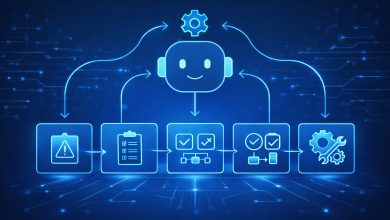The artificial intelligence revolution isn’t just reshaping technology—it’s creating entirely new career paths that didn’t exist a decade ago. Among the most critical and complex of these emerging fields is AI ethics, a discipline that sits at the intersection of technology, philosophy, policy, and human values. But what does it actually take to build a career in this space, and why should business leaders care?
The Growing Demand for Ethical AI Expertise
As AI systems become increasingly integrated into our daily lives—from healthcare diagnostics to hiring decisions to financial services—the need for professionals who can navigate the ethical implications has never been more urgent. Companies are no longer asking if they should consider ethics in their AI deployments, but how to do it effectively.
“In the real estate investment space, we’re already seeing AI tools that assess property values, predict market trends, and even evaluate neighborhood demographics,” notes Dan Mogolosko, Owner of JD Buys Homes. “But without proper ethical guidelines, these systems can perpetuate historical biases in housing. Having someone who understands both the technology and its societal impact isn’t a luxury—it’s becoming essential for responsible business practice.”
The Multidisciplinary Foundation
Building a career in AI ethics requires more than just technical knowledge or philosophical training—it demands a unique blend of competencies that few traditional educational paths provide.
Technical Literacy Without Necessarily Being a Developer
You don’t need to be a machine learning engineer, but you do need to understand how AI systems work. This includes familiarity with data collection methods, algorithmic decision-making processes, and the limitations of current AI technologies. The ability to have substantive conversations with technical teams is non-negotiable.
Philosophical and Ethical Frameworks
A solid grounding in ethics, political philosophy, and moral reasoning provides the conceptual tools needed to identify and articulate ethical concerns. This isn’t about abstract theorizing—it’s about applying rigorous ethical frameworks to real-world technological challenges.
Policy and Regulatory Awareness
AI ethics professionals must navigate an evolving landscape of regulations, from the EU’s AI Act to sector-specific guidelines. Understanding how policy is made and implemented is crucial for translating ethical principles into actionable organizational practices.
Business Acumen
Perhaps surprisingly, business understanding is one of the most underrated skills in AI ethics. Ethics professionals who can’t speak the language of ROI, risk management, and operational efficiency will struggle to gain traction in corporate environments.
“When you’re running a lean operation like ours in the tech rental space, every decision has to make business sense,” explains Liam John, Founder of Digital Marketing Agency. “An AI ethics expert who understands our business model and can help us implement ethical AI practices without derailing our growth trajectory—that’s incredibly valuable. It’s not about saying ‘no’ to innovation; it’s about innovating responsibly.”
Essential Skills and Competencies
Beyond foundational knowledge, successful AI ethics professionals develop several key competencies:
Critical Analysis and Pattern Recognition: The ability to identify potential ethical issues before they escalate into crises is invaluable. This means looking beyond obvious concerns to identify subtle biases, unintended consequences, and systemic risks.
Communication Across Audiences: AI ethics professionals must translate complex concepts for diverse stakeholders, ranging from C-suite executives to engineers to the general public. Each audience requires a different approach and vocabulary.
Stakeholder Engagement: Ethical AI isn’t created in a vacuum. Building consensus among diverse groups with competing interests requires diplomacy, empathy, and strategic thinking.
Practical Problem-Solving: The field needs pragmatists who can propose workable solutions, not just identify problems. This means developing frameworks, tools, and processes that organizations can actually implement and utilize.
Breaking Into the Field
The path into AI ethics is rarely a linear one. Professionals come from diverse backgrounds, including computer science, philosophy, law, social sciences, policy, and various industry domains. What matters most is demonstrating:
- A track record of cross-disciplinary thinking that bridges technical and humanistic concerns
- Concrete experience with AI systems, whether through research, implementation, or critical analysis
- Published work or thought leadership that demonstrates your perspective and expertise
- Active engagement with the AI ethics community through conferences, working groups, or collaborative projects
The Business Case for AI Ethics Professionals
For organizations still undecided about investing in AI ethics expertise, the calculus is becoming increasingly apparent.
Carter Crowley, Owner of CB Home Solutions, puts it simply: “We’re exploring AI tools to streamline our home buying process and improve customer service. However, I’ve seen what happens when companies rush into AI without considering the implications—damaged reputations, legal liability, and loss of customer trust. Bringing in someone who can help us get it right from the start isn’t an expense; it’s risk management and brand protection rolled into one.”
The costs of getting AI ethics wrong are mounting: regulatory fines reaching into the billions, class-action lawsuits, consumer boycotts, and irreparable damage to the brand. Meanwhile, companies that approach AI thoughtfully are building competitive advantages through enhanced trust, better talent attraction, and more robust systems.
The Reality: Challenges and Rewards
Building a career in AI ethics presents its own set of challenges. The field is still defining itself, with roles and responsibilities varying widely between organizations, and ethics professionals often find themselves advocating for unpopular positions that can slow down product launches or constrain AI applications.
Job security can be precarious—ethics teams are sometimes among the first cut during economic downturns. The work can also be emotionally taxing, as you’re constantly confronting the ways technology can harm vulnerable populations.
Yet for those committed to the field, the rewards are significant. You’re shaping the future of transformative technologies during a critical window when norms and practices are still being established. You’re protecting real people from real harms. And you’re part of a growing global community working toward more just and equitable technological futures.
Looking Forward
As AI capabilities expand and societal awareness of AI risks grows, careers in AI ethics will only become increasingly central to technology development and deployment. The professionals who succeed will be those who can balance idealism with pragmatism, who understand both code and consequences, and who can navigate the messy reality of implementing ethical principles in complex organizational contexts.
For aspiring AI ethics professionals, the message is clear: start building your multidisciplinary expertise now, engage with the community, and develop a point of view. For organizations, the time to integrate ethical expertise into your AI initiatives isn’t after problems emerge—it’s before you deploy your first system.
The future of AI will be shaped not only by what we can build, but also by what we choose to develop and how we choose to implement it. AI ethics professionals are the architects of that choice.




